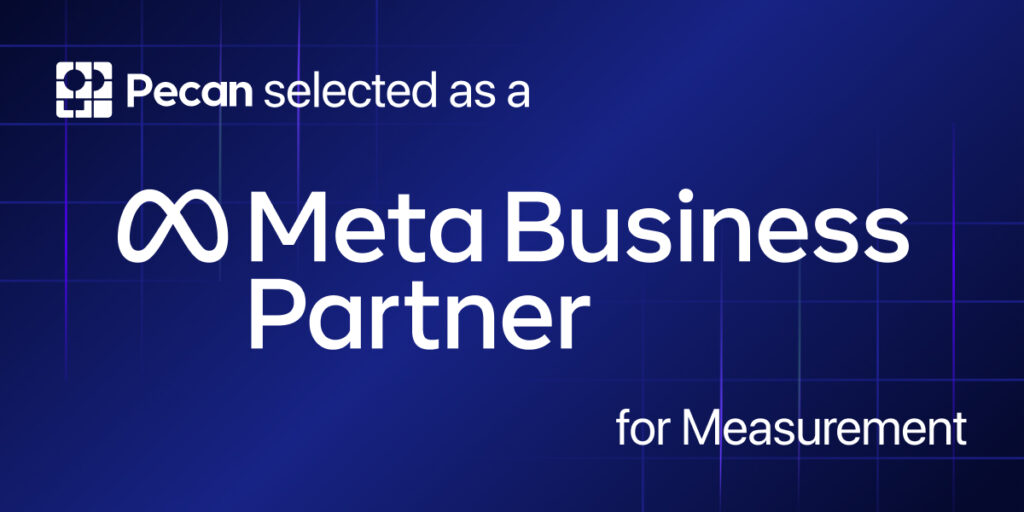In a nutshell:
- Machine learning is a valuable tool for marketing analysts to analyze and improve marketing campaigns.
- Acquire basic knowledge of machine learning principles and find the right low-code tools.
- Choose a specific project and run the machine learning process, including data preparation, model building, and result evaluation.
- Interpret the results to make data-driven business decisions.
- Start using machine learning with Pecan's platform for a free trial or demo.
As a marketer, you're bombarded with information about new technologies that can assist in your job. With so many tools out there, it can be difficult to figure out which are useful and which to avoid. One technology that continues to gain steam is machine learning, providing ways for people in all roles and industries to up their game and improve their work. Applications of machine learning in marketing are expanding daily, fueled by the latest innovations in AI.
"While AI has made inroads in marketing, we expect it to take on larger and larger roles across the function in the coming years."
— "How to Design an AI Marketing Strategy," Harvard Business Review
How can AI and machine learning be used in marketing?
It's all about those models — but we're not talking about humans here. AI in marketing includes using machine learning models to automate and enhance marketing programs, including digital marketing and offline marketing.
By analyzing large volumes of data, AI can identify patterns and provide valuable insights to aid in decision-making.
One of the key benefits of AI in marketing is the ability to gain deeper insights into customer behaviors and preferences. Additionally, generative AI models can create new content based on existing text and images, allowing for the development of personalized and optimized marketing assets.
Machine learning plays a role in many AI tools in marketing, including SEO optimization, content creation, and predictive analytics. These tools can also enable the implementation of personalized marketing strategies, such as chatbots and targeted advertising.
Instead of focusing on retrospective, historical data analyses, machine learning is predictive. For example, by analyzing patterns of behavior on your website, machine learning can help predict which customers will churn, enabling you to optimize offers to prevent this from happening.
As AI becomes more widely adopted, its use in marketing is expected to increase. A survey found that 35% of CMOs have already adopted generative AI tools, and it is predicted that over half of all Americans aged 12 to 44 will use generative AI by 2025.
AI and machine learning together have the potential to revolutionize marketing by providing valuable insights, automating processes, and enabling personalized and optimized marketing strategies.
What are the roles of AI and machine learning in digital marketing, specifically?
Digital marketers come to work daily to face piles and piles of data. Making sense of it, much less taking action on it, is a massive task.
AI and machine learning play a crucial role in digital marketing by helping them deal with that challenge. Machine learning can crunch all that data by leveraging advanced algorithms and models to automate and enhance marketing programs.
These technologies can analyze large volumes of data and identify patterns, giving marketers deeper insights into customer behaviors and preferences. For example, AI can be used to optimize website SEO by analyzing search patterns and recommending keywords and content strategies. It can also assist in content creation by using existing text and images to generate new content.
Predictive analytics is another common feature of AI tools in marketing, allowing digital marketers to make data-driven decisions and anticipate customer needs. Chatbots and targeted advertising are better personalized through predictions, as opposed to vague customer segmentation concepts created with historical data. Even better, AI tools can help marketers continuously analyze and adjust strategies based on current data, helping them make a bigger business impact.
Is marketing automation an example of machine learning?
Marketing automation and machine learning aren't exactly the same, but they're very often related. Marketing automation uses technology to automate repetitive tasks like email marketing campaigns, social media advertising and posting, and lead nurturing. On the other hand, machine learning is a type of artificial intelligence that lets systems learn and improve from data without being manually programmed.
That said, marketing automation certainly benefits from machine learning innovations to enhance its capabilities. As mentioned above, marketers can predict customers' future behavior with machine learning, and then use automated tools like email campaigns to offer fine-tuned messages and offers.
So marketing automation isn't the same as machine learning, but they're definitely BFFs — and marketers love them both.
Potential Disadvantages of Machine Learning for Marketing
Could using ML in marketing make us too dependent on technology?
Some folks might worry that using machine learning in marketing could make us too dependent on algorithms, potentially sidelining human creativity and intuition, the reality is, they can be partners — not replacements. Machine learning excels at crunching data and finding trends, saving us time to focus on the strategic and creative components of marketing. Humans still bring gut feelings and spicy ideas that machines might miss. It's not about picking sides but finding a sweet spot where the tech and humans' creative vibes coalesce.
Will using ML in marketing result in job losses for marketers?
While there's concern that bringing machine learning into the marketing game could lead to job losses for marketers, it's crucial to see the bigger picture. Rather than stealing jobs, machine learning can be a sidekick, taking care of repetitive tasks and number-crunching. It's like having a super-efficient assistant! This tech upgrade might reshape certain roles, but it can also birth new ones that thrive on creativity, strategy, and understanding human nuances.
Five Steps Toward Implementing Machine Learning for Marketing
Now that we've gotten those concerns out of the way, are you ready to dive into machine learning?
The good news is that you can gain all the benefits of machine learning without having to know Python or any other coding language.
With just a few simple steps and the help of some cutting-edge technology, you can start to work more efficiently and make better, well-informed, data-driven decisions.
Step 1: Acquire Knowledge
While you don’t need an advanced degree in data science, you will need to educate yourself on the basics of machine learning, specifically on topics like data considerations, classification and regression models, and model performance metrics.
It isn’t necessary to go in-depth and learn the intricacies of how machine learning works, but you should read resources and watch tutorials to master the terminology and gain a basic understanding of the different types of algorithms and their applications.
Once you have a general understanding of the principles involved in machine learning, you can move on to the next step.
Step 2: Find the Right Tools to Use Machine Learning for Marketing
While you’re familiarizing yourself with the basics of machine learning, you’ll definitely see many references to code in use. Don’t panic! You can skip right over those parts and just focus on the big-picture concepts. This is because there are a number of low-code tools out there designed specifically for people who don’t know how to code to use machine learning.
How do you know which tool will be right for you? Some of the key elements to look for include:
- Easy-to-use and intuitive interface
- Able to integrate with a variety of data sources
- Automated model building
- Fast results
Put simply, you are looking for a tool that will allow you to easily connect your data source, automatically build the model relevant to the questions you aim to answer, and provide you with quick results. You’ll also want it to be simple to tweak the model when adjustments are needed to get the most relevant results.
Pecan’s platform, for example, provides our Predictive GenAI capabilities. These include a natural-language, GenAI-powered Predictive Chat that guides you in defining a predictive question that can be answered with a model based on your raw data. Auto-generated SQL kickstarts your model, which the Pecan engine then automatically builds. The model uses hidden patterns in your data to generate predictions. With those predictions, you can the fast answers you need about everything from predicting customer churn to predicting return on ad spend, allowing you to create the most optimal marketing strategy.
Step 3: Create Your First Project
This is where the fun part starts. Once you’ve selected the tool you’re going to use, next decide what specific question or issue you are going to tackle using machine learning. This will, of course, depend on the current priorities of your business or team. Possibilities include:
- Predicting customer lifetime value
- Optimizing marketing campaign results
- Preventing customer churn
- Targeting upsell and cross-sell offers
- … and many more.
The options are almost endless. Any issue that you and your team are currently dealing with will likely be addressable with machine learning, helping you make decisions based on real live data and what it can tell you about the future.
Step 4: Run the Machine Learning Process for Your Marketing Project
A few steps are necessary to get the results you need from the machine learning tool. These steps include:
- Preparing the data: This is one of the most critical steps in the process. Selecting the right data for modeling is critical as you need to provide the tool with the relevant information it needs to answer the specific questions you’re asking. If the platform is given “bad” or incorrectly chosen data, the results will be inaccurate and unhelpful. It’s crucial to ensure that the data source is clean with no duplicates or errors. (Fortunately, Pecan can handle tidying these data cleaning steps for you, even if your data's messy.)
- Building the model: With some input from you, the tool will create a model for you and begin to make predictions. During this part of the process, the platform will experiment with different algorithms behind the scenes and adjust parameters until you get results you are satisfied with.
- Evaluating the results: This step determines how well the model performed, using metrics like accuracy, precision, and recall. In machine learning, different performance metrics may be used that reflect the model's business goal.
It's a long and tedious process when a data scientist has to perform the above steps manually. Yes, they have the coding and analysis skills necessary to build and evaluate a model, but by the time they get the results, market conditions may have already changed, making the information already out of date.
When using an automated, low-code platform, on the other hand, you’ll get fast and reliable results quickly. Pecan, for example, includes an automated data preparation process, saving a lot of time during that step. You still need to select which data set to use — and as a marketing team, you are in the perfect position to do so, since you know your data best — but you don’t have to worry about cleaning up the data manually.
And, if you aren’t satisfied with the model’s predictive performance the first time, the platform offers the agility to make adjustments and re-run the model for new results within minutes.
Step 5: Interpret Machine Learning Predictions and Make Marketing Decisions
The model will provide you with predictions based on your company's data, and then it’s up to you to interpret those results and use them to make business decisions. If, for example, you’re using a machine learning tool to help you evaluate the early performance of advertising campaigns soon after launch, the results will tell you which campaigns will provide the highest longer-term return on ad spend (ROAS). You can then use this information to allocate your budget accordingly, focusing on the campaigns, potential customers, and channels that will give you the best return.
As a marketer, you have deep insight into your team’s needs and goals. You know what kind of results you want to see from various marketing activities, so you’re well-positioned to look at predictions generated from machine learning and understand what they say about your marketing efforts.
Instead of making educated guesses as to what steps to take next, all of your decisions will be backed up by data and knowledge of the future, giving you the confidence to move forward to greater success with a competitive edge.
The Results of Using Machine Learning for Marketing
Predicting user lifetime value in mobile gaming
KSG Mobile, Inc. (KSGM) is a mobile game publisher that craved more bang for their buck in the social casino games arena. Facing challenges in accurately estimating user lifetime value (LTV) and return on ad spend (ROAS), KSGM adopted Pecan's predictive LTV modeling, forecasting revenue from users acquired through various channels and campaigns. They gained shorter-term predictions for on-the-fly adjustments and longer-term projections for savvy budget planning. Plus, they could spot underperforming campaigns early, then confidently direct marketing dollars where they would matter most.
Using marketing mix modeling to increase marketing efficiency
A major U.S. company faced the challenge of optimizing a diverse omnichannel marketing budget exceeding $1 billion. Turning to Pecan's Marketing Mix Modeling (MMM), the company utilized four years of data to predict inbound inquiries based on ad spending. This model, offering both short- and long-term predictions, became instrumental in navigating the complexities of channel allocation. Pecan's MMM showcased channel impact and introduced simulation tools for easy adaptation to changing circumstances. The results were game-changing, unveiling opportunities for over $100 million in yearly cost-cutting.
Ready to Get Started?
If you’re ready to start using machine learning to enhance your marketing and help you make more informed and more effective decisions, we invite you to try out Pecan.
Start a free trial today—or contact us to set up a demo—and learn how machine learning for marketing can help your team succeed.






